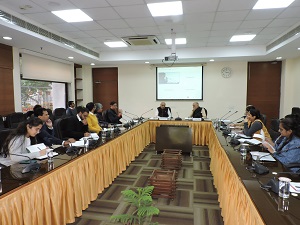Book Discussion – Iconic Indians: 75 Extraordinary Individuals Who Inspired the Country by Sanjeev Sanyal and Rajesh Singh
On 24th November 2022, Vivekananda International Foundation (VIF) organised a book discussion on “Iconic Indians: 75 Extraordinary Individuals Who Inspired the Country,” authored by Sanjeev Sanyal and Rajesh Singh. Apart from the authors, the panel consisted of Dr Arvind Gupta, Director VIF (moderator), Dr Vinay Sahasrabuddhe, President of the Indian Council for Cultural Relations and Prerna Gandhi, Associate Fellow VIF.
In his opening remarks, Dr Arvind Gupta spoke about the book’s timely release at the mark of India celebrating its 75 years of independence. He further elaborated on the unsung heroes and the wide-ranging personalities covered in the book. He acknowledged that despite their tremendous contributions, we still have only nodding acquaintance and limited familiarity with these Indian personalities who helped shape India post-Independence. He spoke of the importance of covering scientists and military personnel in the book, who are the real nation builders, alongside the other well-known Indians.
Sanjeev Sanyal started his remarks with an insightful comment, “Narratives are seldom replaced by criticism; other narratives replace them.” He further elaborated on the need for a more representative narrative of the people who built this country. The book intended to create a national memory of contributions at different points in time, spread across the region and from various fields and sectors. He further mentioned that the book includes people from all ideologies and political spaces to create inclusivity that the current literature lacks. He then elaborated on the role of some of the personalities covered in the book, like Syama Prasad Mukherjee, BB Lal and Balbir Singh Dosanjh. He spoke at length about the glorious yet tragic life of Mihir Sen, a swimmer, businessman, politician and lawyer, who brought India great recognition during a time when India was only known for hockey. He also shared the story of RC Majumdar, an Indian historian, who was able to write Indian history more freely under the British Raj than in independent India. RC Majumdar eventually faded away from Indian history altogether.
Rajesh Singh, the second author, raised a pertinent question: “Has the space for thinking and writing been shrinking over the last decade?” He further elaborated that the space, on the contrary, has expanded. Earlier, the literature in India held one narrative and alternate narratives were often side-lined. However, the alternate narratives have found a larger space to come into the public domain to receive the credit they deserve. So the larger space of narrative in the last decade has evolved substantially in the most democratised manner. He further quoted the example of Anant Pai, one of the 75 personalities covered in the book. Pai was one of the most prominent comic writers who brought Indian stories and mythology to the younger generation to develop an interest and understanding of India’s rich literary tradition. He also elaborated on the remarkable contributions of Bachendri Pal, the first Indian woman to climb Mount Everest and Sambhu Nath De, a medical scientist who discovered the cholera toxin.
Dr Vinay Sahasrabuddhe focussed on the effect of identity on the consciousness of a nation. He further elaborated that identity is often passed on from one generation to another. It is necessary for a certain amount of continuity in history to retain and evolve the identity. Hence, it is imperative to give due attention to contemporary history, which is often neglected. The book came at an opportune time to showcase and revive the notions of contemporary history. He further spoke about the ‘inspiration’ and its emergence. He said that an inspiring personality is a product of two acts, one, the heroic actions done by the person and two, the existence of that person in the consciousness of the layperson. Therefore, this book brings about the consciousness of these remarkable people, which makes them inspirational. He also complimented the authors for the rare photographs included in the book.
Prerna Gandhi presented her remarks starting with a quote from Geeta that says that learning from the experience of others is as good as creating your own experience. She further elaborated that the cumulative passing down of knowledge to future generations creates a continuum of culture, simultaneously avoiding repeating mistakes within our history. She highlighted the lack of biographies of Indians in Indian literature and the importance of the book in doing the same. She further applauded the simplicity and compactness of the book as well as the vivid and lucid description of each personality.
The authors further shared their methodology in compiling the prominent names for the book and the gruelling process of addition and omission of people who have done extraordinary work for India but could not be added to the 75 people included in the book. The authors also showed interest in possibly coming up with a new edition for the centennial independence anniversary of India.







Post new comment